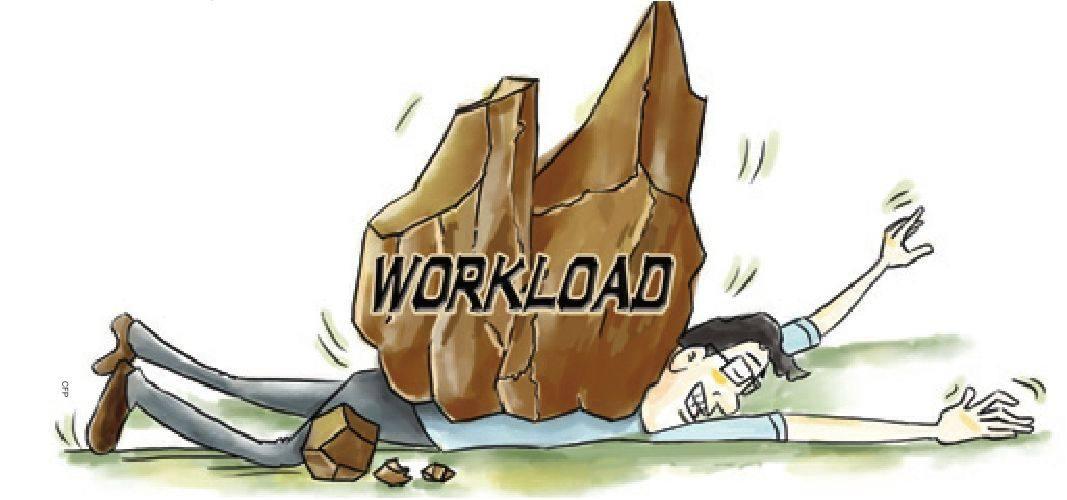Dying for a Living
2012-04-29ByLiLi
By Li Li

Chinas young professionals have lost upward motivation compared with older generations as a result of career-related stress. According to a recent survey conducted by China Youth Daily, out of 4,155 white-collar workers surveyed, 51.5 percent believe that an ideal position is where one feels comfortable and can use his or her skills to the best and 46.9 percent believe that a promotion leads to more pressure and may disrupt the balance between career and life. Among the respondents, 65.4 percent were born after 1980.
Zhao Liyong, a young IT engineer working in the same company for six years, rejected a recent promotion offer as the manager of the companys technical department.“I wont be at ease at a managerial position. I prefer doing what I am good at. Moreover, the current job gives me more spare time,” Zhao told China Youth Daily.
Zhaos prudence about climbing the corporate ladder may sound like a humorous inversion of the Peter Principle which states “employees tend to rise to their level of incompetence.” But the toll on public health exacted by career-related stress in China is no laughing matter. Media outlets have reported many cases of young workaholics dying on the job or committing suicide as a result of occupational pressures in recent years.
Fatal stress
Xu Wenjun, 29, owned an online clothing store. The father of a 2-year-old daughter died suddenly while driving his car from a clothing warehouse. Xus wife, who ran the store with him, said that her husband could not sleep at all on the previous night, worrying about a problematic batch of supplies.
In the early morning of October 21, Xus wife spoke to her husband on the cellphone for the last time. “When I woke up, I found him gone. He told me on the phone that he was checking the stock at our suppliers place and he would be home by noon,” she said. But at around 1 p.m. Xu was found collapsed behind the wheel of his car, parked at a highway exit.
The forensic report relating Xus death to overwork and exhaustion came as no surprise to his family as he often worked after midnight to respond to buyers questions and complaints online. His sleep-deprived lifestyle had lasted for more than four years ever since he opened a store on Taobao.com, Chinas answer to eBay.
In April, 2011, Pan Jie, an auditor at the Shanghai branch of PricewaterhouseCoopers, died suddenly at the age of 25. Although the company said that she died of viral encephalitis after a high fever prompted her to ask for sick leave, many people believed the tragedy stemmed from karoshi, a Japanese term that literally means death from overwork.
Work pressure has also become a leading cause of police officer fatalities in China. According to the Ministry of Public Security, overwork was behind the deaths of 47 percent of officers who died on duty from 2006 to 2011.
Some medical experts believe that the sudden deaths of many young workers, who appeared to be very healthy, are not so sudden after all. Instead, the enormous workload has forced them to ignore the signs of some critical illnesses.
According to a survey conducted by China Youth Daily on 4,027 people, 99.7 percent respondents said that they know young colleagues who choose to ignore signs of diseases and 58.4 percent said that the young generally dont take good care of themselves.
The same survey also revealed that when feeling ill, only 11.4 percent of the respondents would go to see a doctor immediately.
Lei Ming, a young professional of international trade, suffered from a mere flu virus that developed into a near-death experience. After suffering a prolonged cold at the end of 2002, Lei casually took some medicine but didnt take sick leave to seek professional care. Over time the cold developed into an inflammation of the muscles of his heart and an extremely rapid heart rate.
As a result of his conditions, Lei has to take heart medicine with him all the time and has been sent to emergency rooms four times this year alone. “Young peoples sudden deaths have a lot to do with their lack of medical knowledge and many deaths can be discovered earlier and prevented,” Lei told China Youth Daily.
Liu Qi, a research fellow with the Institute of Sociology at the Shanghai Academy of Social Sciences, has conducted case studies on deaths from overwork. He found out that alleged karoshi victims in China died at 44 on average. Those succumbing to exhaustion in the IT industry died even earlier, at 37.9 years of age.
According to Lius studies, IT professionals in general suffer from long overtime, night shifts, immobility and nervousness.
Money matters
A recently released survey indicated nearly eight out of 10 Chinese workers became more stressed in the past year, making them the most stressed professionals in the world.
Some 75 percent of Chinese workers are feeling more pressure this year than last, according to the poll conducted in September by serviced office space provider Regus.
The survey, which canvassed the opinions of more than 16,000 workers worldwide, concluding China held the highest rate of increasing stress levels of all the countries polled. The leading causes of stress were identified as employment, finances and customer demands.
The poll said that the stress levels rose for 45 percent of workers in Japan and 58 percent of those in Germany, which came second in Regus rankings of increased stress.
The Regus survey results were echoed by several domestic surveys. A survey conducted by Chinahrd.net, a website for human resources professionals, revealed that more than 80 percent of employees in China work overtime regularly. The China National Radio reported that only 30 percent of employees in China enjoy a paid holiday. According to a recent survey on 1,000 office workers of all age groups in seven major Chinese cities, two thirds of the respondents said that they are in a poor state of health and blamed work pressure, environmental pollution and a sedentary lifestyle for their imperfect health.
Even worse, workplace pressure could deteriorate Chinese peoples mental health as ongoing pressure can cause depression. A 2010 study by medical journal Lancet estimated that roughly 173 million Chinese suffer from a mental disorder. Roughly, it means that nearly one in five adults has a mental disorder, as defined by the Diagnostic and Statistical Manual of Mental Disorders.
Chinese workers are indeed experiencing more pressure from work than before, said Xiao Minzheng, Director of Peking Universitys Center for Human Resource Development and Management Research.
“China has yet to improve its housing, healthcare and pension systems, and thats why Chinese workers are under more pressure,” said Xiao.
Xia Xueluan, a sociology professor at Peking University, said that because Chinas social safety net cannot guarantee individualsbenefits in health care, pension and childrens education, individuals are under intense pressure to acquire wealth, especially middleaged professionals who have to support their parents and children.
Xia said that Chinas traditional teachings, especially those of Confucius, have also given people a lot of peer pressure.“Competitiveness in many workplaces originates from Chinese parents tendency to push their children to excel in schools and their careers,” he said.
Hu Yinglian, a lecturer at the Chinese Academy of Governance, told China Youth Daily that besides work pressure, people become anxious due to the existence of social unfairness and a yawning income gap. “Many people feel deprived, whic h further poisons the shallow social culture glorifying the pursuit of material wealth,” he said.
Netizens in various Chinese cities participated in a popular online survey inquiring about the amount of “monthly income needed for a panic-free life” earlier this year. It revealed that a person needed to earn around 9,000 yuan ($1,429) a month to avoid “feeling panic” in big cities like Beijing and Shanghai and around 5,000 yuan ($794) in smaller cities like Dalian and Tianjin. These “ideal”incomes are without exception much higher than actual average personal salaries in these cities.
